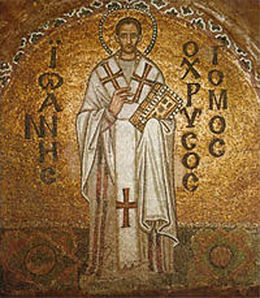Monday, October 29, 2012
St. Augustine Questions (Part I)
1. What do you think Augustine means by his desire being “not to be more sure of [God] but to be more steadfast in [Him]?
2. What is the single thing that Augustine identifies as preventing him from giving himself over wholly to the Christian faith?
3. He points out that neither Christ nor St. Paul forbid marriage, so why does he not pursue that path and choose to live his life as a married Christian man.
4. Augustine says that God and His word are “everywhere implied” in the writings of the Platonists. Do a little digging on the Platonists and identify some Christian values that are implied in Platonic thought.
5. Victorinus asked “Then is it walls that make Christians?” His same argument is made today by those who assert that they are Christian but do not “go to Church”. Is the argument any more valid coming from Victorinus than it is today?
6. St. Augustine observes that human nature is to love “regained” things more than those that we have had all along. Do you agree that this is in fact part of human nature? Provide an example from scripture that reflects this as part of God’s nature as well?
7. Again, Augustine observes that “the greater joy is heralded by greater pain.” Does this mean that it is impossible for us to know great joy without great pain? Explain – provide an example from your life and a theologically based example. How does Augustine’s life reflect this maxim? 8. Compare Augustine’s metaphor of the Chain with that of St. Gregory of Nyssa. How could you combine these metaphors.
9. St. Augustine writes at length about how he postpones his conversion and keeps saying later, and later still. He then says the “law of sin is the fierce force of habit”. Does this mean that by repeating a sin we forfeit our will and give the sin control? Explain.
10. Why do you think the influence of the story of St. Anthony is not as strong today as it was on Augustine and Alypius?
Monday, October 15, 2012
St. John Chrysostom

1. Christ says that we do not come to God unless we are “drawn” to him. Explain how Chrysostom says that this does not interfere with our Free Will. Would this imply that God only chooses to draw “some” people to Himself and not all?
2. In discussing the Bread of Life Discourse, what reason does Chrysostom give for Christ “shrouding his explanation in mystery”? What is his criticism of Christ’s audience upon hearing this “hard saying”?
3. At the bottom of pg. 104 Chrysostom describes the role of a disciple in regard to asking questions. What do you think of his description? Do you agree or disagree, and why?
4. Explain why Chrysostom thinks asking the question “How can this man give us his flesh to eat?” is the wrong question to ask. What should have been asked instead – and what do you think the results would have been of asking the “right” question?
5. Chrysostom writes a particularly beautiful passage on page 105: “Therefore, in order that…as the body is joined with his head.” What is the purpose, in his opinion, of this “commingling” with Christ and humanity? What role does the Eucharist play in this “commingling”?
7. Chrysostom references the Eucharist as a “fountain”. How is the Eucharist like a fountain in the life of a Christian?
8. On pg. 107 Chrysostom talks about the danger of taking the Eucharist “unworthily” or with the wrong disposition. What do you think makes for an appropriate (or inappropriate) disposition?
Wednesday, October 3, 2012
St. Gregory of Nyssa

Please read Pope Benedict's catechetical essay on St. Gregory, as well as the writing in your text.
Questions:
1. Very early on, Gregory compares being a Christian to being a doctor, a politician, mathematician, etc. and says that just as these professions require an education, so to does being a Christian. Do you think that we really must have some level of education before we can call ourselves Christian? Explain.
2. What do you make of the "dancing monkey" illustration? We live in a society that largely calls itself "Christian" and yet we persist in crime, violence, injustice, and vice. Are we any more than dancing monkeys?
3. Gregory writes that to unite ourselves to Christ means to share in the "lofty ideals" that are used to describe him. Does this mean that if we do not assume the noble virtues in our character that we are not truly united to Christ? Compare the meaning of this segment to the discussion we had about the Ascension a few weeks ago. (Why did Jesus have to ascend?)
4. How does Gregory assert that Christianity "returns" man to his former or original state?
5. What reason does Gregory give (on the top half of pg. 64) for us being accurate imitators of the Divine?
Subscribe to:
Posts (Atom)
